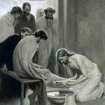It’s that time again: Halloween. One church announcement reads: “Mountains
of candy. Crazy decorated trunks. Fire eaters, break dancers, jugglers.
Come to Trunk-or-Treat this Thursday. Doors open at 5:30 pm.” And what else are we opening
our doors to?
I know there are a ton of conservatives who will be throwing eggs at Christian halloweenies, convinced it is wrong to participate in a day whose origins are as pagan as witches, vampires, ghosts, and devils. Others will innocently claim we have moved far away from Halloween’s beginnings—just as we have from those of Christmas.
So let's put the question to the “redeeming values” test. Does Halloween have any redeeming value, that is, good qualities about something outweighing the bad things? Certainly Christmas has been redeemed from its pagan beginnings. But can the same be said for Hallows Eve, the night before “All Saints Day,” as it is called. Is this an unholy trick? Have we been halloweened!
I know there are a ton of conservatives who will be throwing eggs at Christian halloweenies, convinced it is wrong to participate in a day whose origins are as pagan as witches, vampires, ghosts, and devils. Others will innocently claim we have moved far away from Halloween’s beginnings—just as we have from those of Christmas.
So let's put the question to the “redeeming values” test. Does Halloween have any redeeming value, that is, good qualities about something outweighing the bad things? Certainly Christmas has been redeemed from its pagan beginnings. But can the same be said for Hallows Eve, the night before “All Saints Day,” as it is called. Is this an unholy trick? Have we been halloweened!
















